Book of the Day Roundup July 20-24, 2020
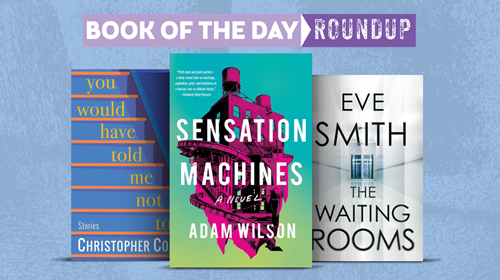
Miracle Country
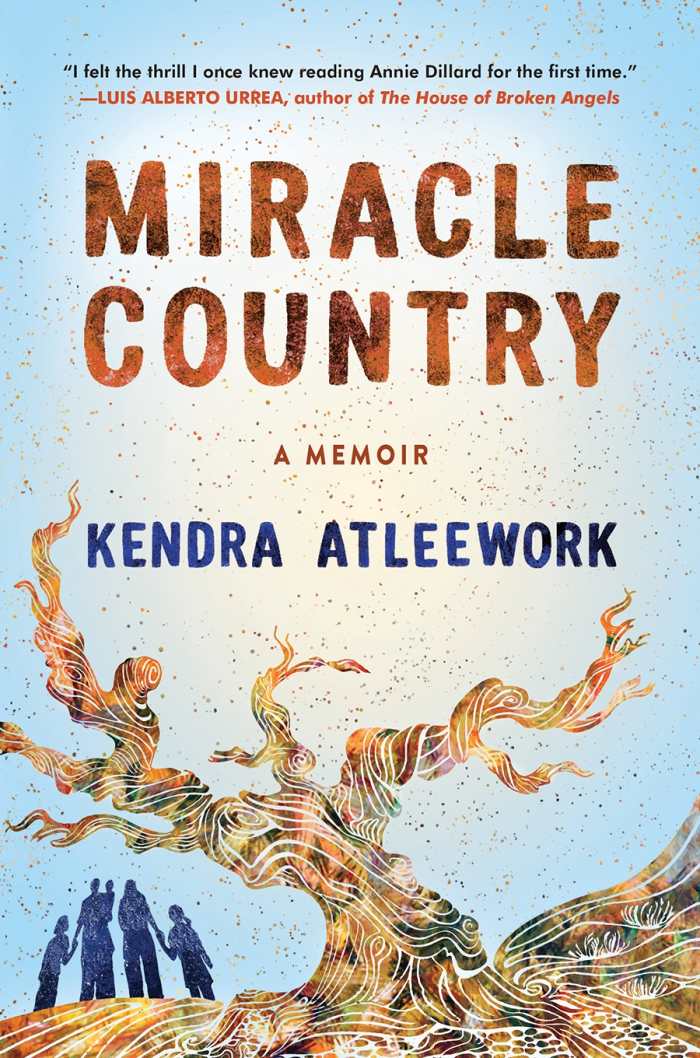
Kendra Atleework
Algonquin Books
Hardcover $27.95 (368pp)
978-1-61620-998-8
Buy: Amazon
Kendra Atleework’s radiant, wrenching memoir Miracle Country probes a home and its heartbreaks for meaning.
Atleework was raised in the Eastern Sierra, in spaces threatened by fire and droughts: “on this obsidian edge of California, God is the wind and the dust it carries.” Her father taught his children to thirst after the skies; her mother led them to dreamy spaces in the woods, where they wondered aloud about her imagined Lupine Land. Despite the challenges presented by the very ground on which they stood, theirs was a near idyllic childhood, captured in snapshots of hot air ballooning, lessons in self-sufficiency, and expressions of love.
But when Atleework’s mother died, her family lost its sense of footing. Her adopted son became angry and rebellious; her daughters grew apart, nursing their pain in more private spaces. And while his children found their ways to flee, Atleework’s father kept their home lit and waiting, knowing that what’s left behind may seem less beautiful, but it still answers a need.
Atleework’s pages filter her grief through the wonders and contradictions of her home state, which she bounced around, fled, and returned to again in early adulthood, getting to know its nuances in stages. Her hometown was a place foreign to the golden dreamers of the state’s tourism brochure locales; its water was rerouted for valley dwellers, and its land, too, was stolen from Native tribes. Atleework is incisive in detailing the losses the Sierra suffered, from that of its first residents to Hetch Hetchy Valley. Her work incorporates the words of Kevin Starr, Joan Didion, and Mary Austin, but remains separate—its own glorious, authentic picture of a place whose residents refuse to be pinned down.
Miracle Country is a singular, sympathetic memoir of loss and belonging, set in a troubled state that still occupies so many people’s dreams.
MICHELLE ANNE SCHINGLER (June 27, 2020)
The Waiting Rooms
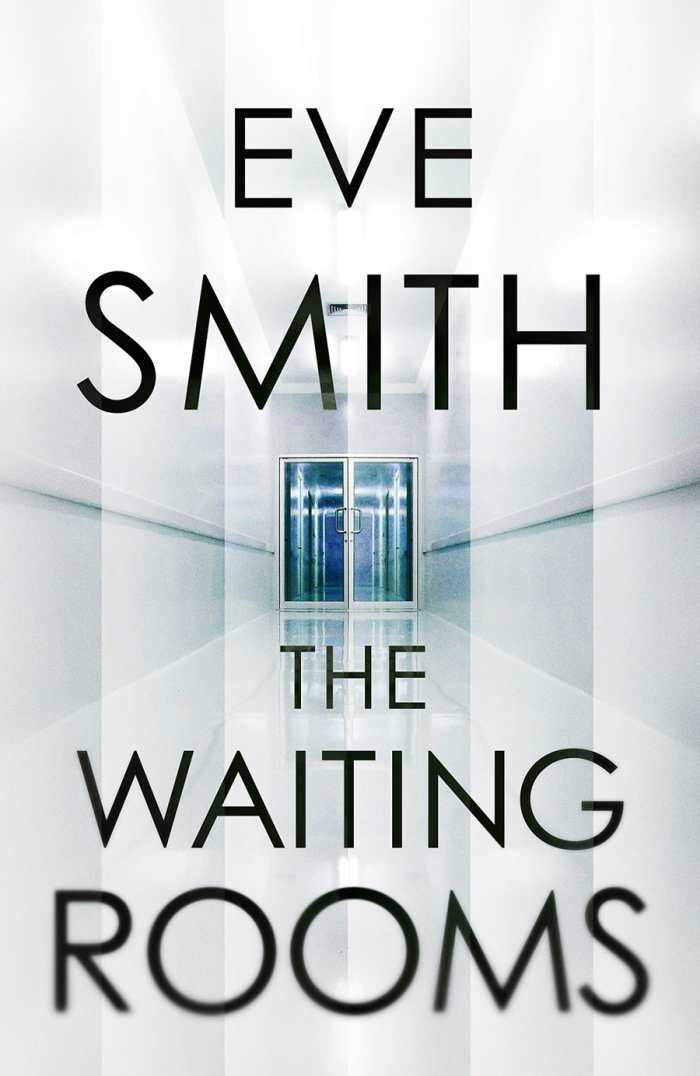
Eve Smith
Orenda Books
Softcover $16.99 (392pp)
978-1-913193-26-3
Buy: Local Bookstore (Bookshop), Amazon
In the near future of Eve Smith’s novel The Waiting Rooms, antibiotics no longer work, and people don’t often make it to their golden years.
Following The Crisis, antibiotic-resistant strains of diseases have overrun the world, killing millions of people. Those who survive adapt, taking strict precautions against getting sick. Directives have been adopted by each country to determine who has access to antibiotics; few live past seventy.
Kate is a nurse, tending to patients who have opted for assisted suicide over slow deaths from disease or infection. In addition to this work, Kate struggles with the death of her mother, her more and more rebellious daughter, and the shocking revelation that she was adopted at birth. As she searches for her birth mother, Kate dips into a mystery that will blow the lid off of The Crisis.
Switching between Kate’s present and the years prior to The Crisis, when Kate’s birth mother, Mary, was a botanist in South Africa, the story becomes that of a world on the edge of breakdown. Mary’s relationship with a married man leads to more than just a baby: it could also be the key to unlocking the world’s future.
The Waiting Rooms is engrossing and eye opening. Fascinating glimpses of news stories and advertisements shed light on the new reality that the characters face. As Kate strives to find her mother, Mary thinks back to her past and all that she regrets. Character studies contrast with heart-stopping plot twists, showing what everyday life would be like in a world wherein medicine no longer cures even the simplest infections. Characters adapt, resulting in a disturbing new reality with an atmosphere of impending doom.
The Waiting Rooms is a stunning medical thriller set in a terrifying possible future.
ANGELA MCQUAY (June 27, 2020)
You Would Have Told Me Not To
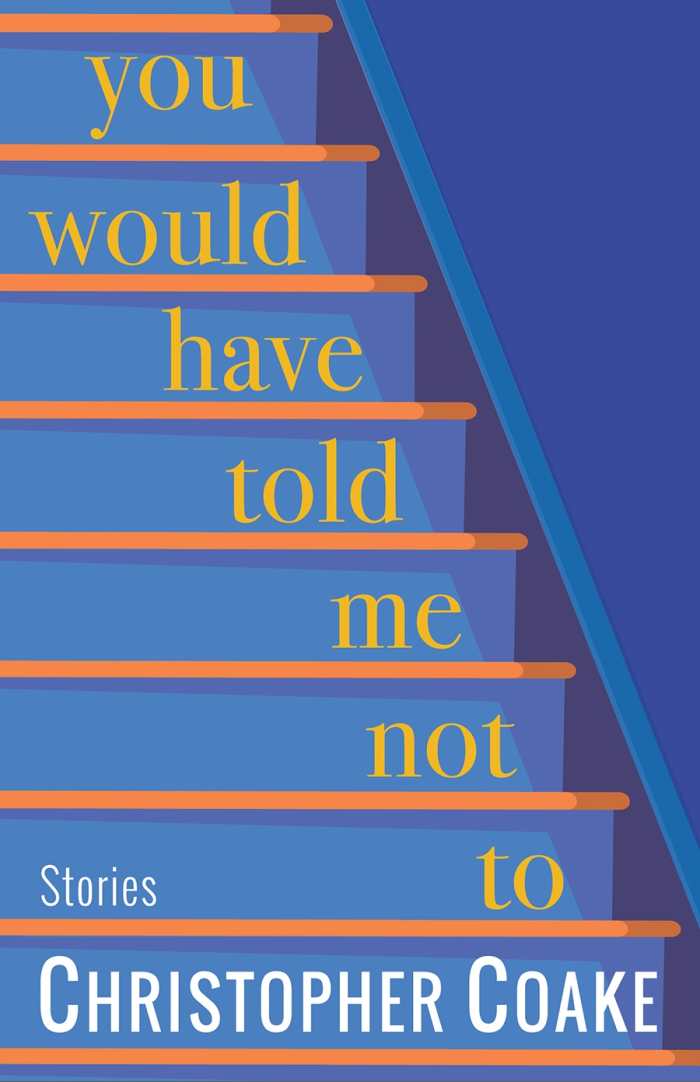
Christopher Coake
Delphinium
Hardcover $24.95 (240pp)
978-1-883285-90-6
Buy: Local Bookstore (Bookshop), Amazon
The seven stories of Chistopher Coake’s realistic and memorable collection You Would Have Told Me Not To concern the various stages of failed relationships.
Interplays between complicated people’s thoughts and actions carry the stories, whose characters contemplate their choices, their escalating circumstances, and how their pasts brought them to their current situations. The powerful story “This Will Come as a Surprise to You” is narrated by a woman who has returned to her hometown after an absence of years. While taking her son to a local coffee shop, she encounters her abusive ex-husband. Curious at first, she soon obsesses over what he’s done in the years since, looking him up online, trying to figure out if he has changed as much as his new life suggests, and debating whether she should say anything to his fiancée. Each piece of information that she finds leads her to dig further, like touching a sore though she knows it will hurt.
Other compelling entries include “Waste,” in which a middle-aged day worker suspects that one of the new men on the job might be his son. The possibility occupies his thoughts during a dangerous assignment. In “You Would Have Told Me Not To,” a woman rushes to visit her son as he recovers from a gunshot wound, only to learn that he’s been keeping much more about his life from her—and that her ex is also visiting. Darker is the novella “Big Guy,” in which a divorced, obese man obsesses over dropping his weight, growing more and more entitled, and dangerous, as his plan works.
The characters of You Would Have Told Me Not To deal with crises including infidelity, abuse, and divorce, but the real drama comes from events’ aftermaths and their emotional impacts.
JEFF FLEISCHER (June 27, 2020)
George Harrison on George Harrison
Interviews and Encounters
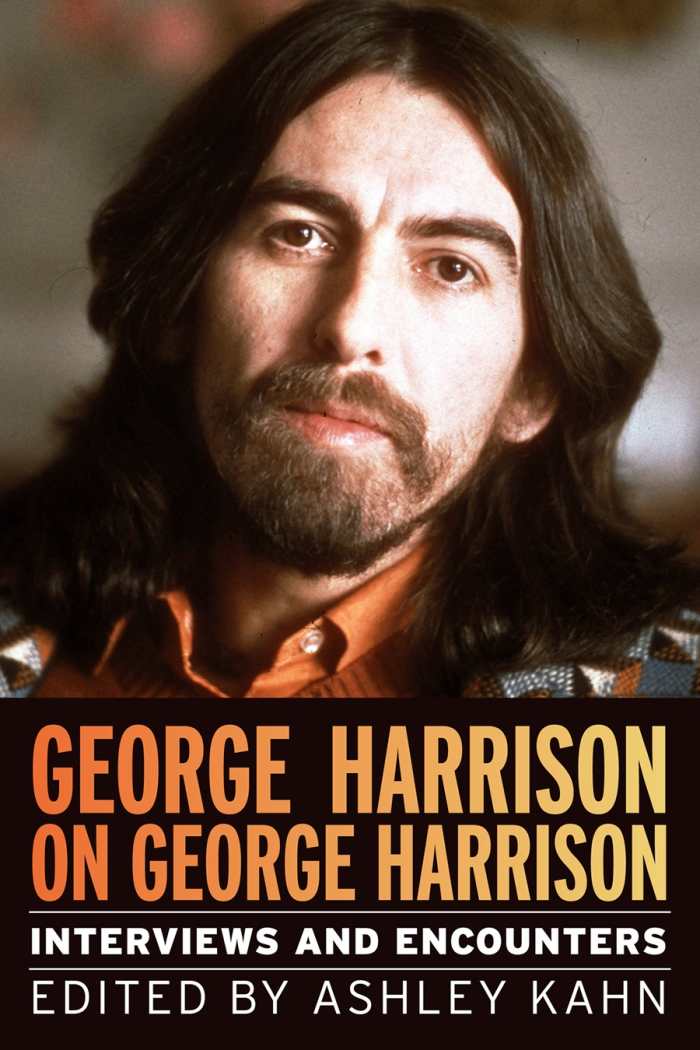
Ashley Kahn, editor
Chicago Review Press
Hardcover $30.00 (432pp)
978-1-64160-051-4
Buy: Amazon
The compiled interviews and texts of George Harrison on George Harrison come from across the music legend’s career, from before the Beatles hit it big up into the final year of his life. This comprehensive, chronological tome is an essential omnibus for Harrison fans, sharing his thoughts, in the moment, about the biggest moments in his career.
Most of the book is made up of transcripts of Harrison (sometimes with his bandmates) from television and radio interviews, press conferences, and even online chats with fans. These include gems, ranging from a 1963 interview with the Beatles right before their Ed Sullivan appearance, in which Harrison ruminates on his hope that the band be able to make music a career for four years, to an awkward 1989 MTV interview featuring three-fifths of the Traveling Wilburys, with Harrison straining to give serious answers to an unprepared interviewer.
The dozens of interviews include conversations with Anthony DeCurtis of Rolling Stone, talk show host Dick Cavett, and Harrison’s friend Michael Palin, of Monty Python fame. Interesting written documents, like Harrison’s 1963-1964 columns for the Daily Express, reveal his thoughts on fame as he was first experiencing it. There’s even a short story from a 1963 high school paper, written by a student who interviewed Harrison when he visited his sister in the United States. Each entry includes a brief preamble from editor Ashley Kahn with context or a reflection on Harrison’s words.
Throughout the pieces, George Harrison comes across as thoughtful not just about songwriting and touring, but about his influences, celebrity, the films he produced, and his friendships in music. The wealth of material in George Harrison on George Harrison makes it possible to track the life and career of this worthy subject, making the text a valuable addition to rock history.
JEFF FLEISCHER (June 27, 2020)
Sensation Machines
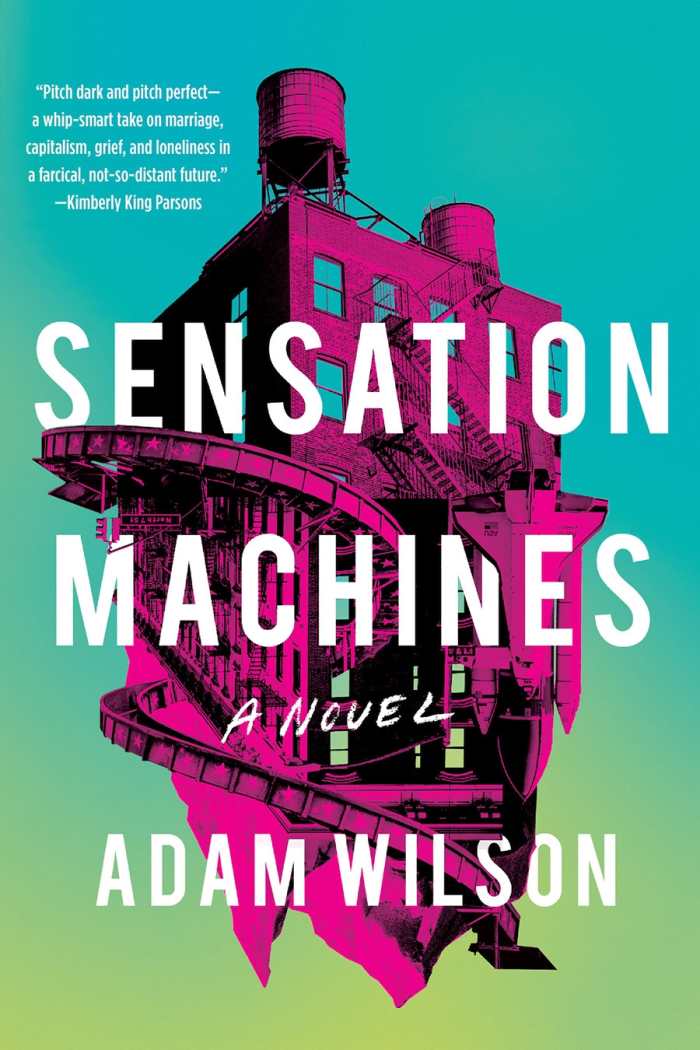
Adam Wilson
Soho Press
Hardcover $27.00 (384pp)
978-1-64129-165-1
Buy: Amazon
Adam Wilson’s near-future Sensation Machines is a delayed bildungsroman for a whole generation.
Wendy and Michael met as college students in New York while navigating the detritus of September 11, 2001. He was a Marshall Mathers acolyte who rapped under the moniker WebMD; she came from privilege, but hankered to be seen.
Twenty years later, they’re married. They are both superstars and villains for their millennial generation: he’s a Wall Street trader on the brink of financial disaster; she’s tasked with developing an ad campaign to impede Congress’s passage of a universal minimum wage, organized under the Holocaust-throwback phrase “Work Will Set You Free.”
Into this disconcerting mix is thrown a murder: on the night of an activists’ funeral for capitalism, the couple’s rich, charismatic friend Ricky is shot dead in his bed. Officers zone in on his doorman as the primary suspect, resting their conviction on the color of his skin. Michael and Wendy, the distance between them widening by the moment, experience disillusionment, sadness, and ballooning nostalgia for what once was, including their dreams of children and the comforts of friendships that have since accumulated dangerous rust.
The text’s gestures to contemporary developments and discontents are evocative. It draws upon Occupy Wall Street, criticisms of neoliberalism, the affronts represented by the presidency of Donald Trump, and New York cultural mainstays, including Sex and the City. It pushes concerns about social media and data sourcing to their logical conclusions, but tempers its inventive technological advancements with the relics that even those thirsty for the future refuse to release—racism and classism prominent among them.
WIlson’s novel is incisive in its deconstructions of generational contradictions. As its earnest leads laud fairness but establish themselves as the greatest impediments to progress, Sensation Machines nods to the adage that, the more circumstances change, the more they stay the same.
MICHELLE ANNE SCHINGLER (June 27, 2020)
Barbara Hodge
